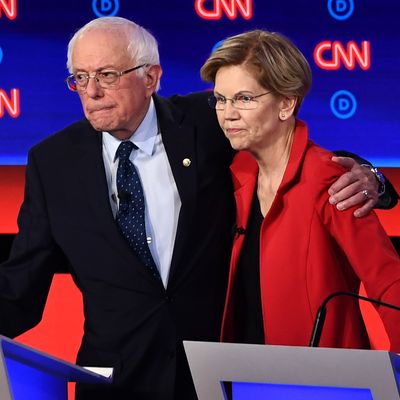
The first two Democratic presidential debates were a frantic leftward race. The first night of the second round was a screeching of the tires as more than half the field repeatedly attacked the front-runners for positioning themselves too far left.
The reasons for this choice are clear. The leading candidates have taken several highly unpopular stances. Meanwhile Joe Biden continues to lap the field despite his extremely shaky first-debate performance. Somebody was bound to try to compete with Biden for the large chunk of voters he’s had to himself.
Unfortunately, the candidates vying for that role have all polled within the margin of error. Still, half of them did their best to stake out that mainstream Democrat turf: Steve Bullock, Amy Klobuchar, John Delaney, John Hickenlooper, and Tim Ryan.
All those candidates questioned the most politically risky stances some or all of the front-runners have taken: single-payer health care that will replace all employer-sponsored plans, decriminalizing unauthorized crossing of the border, providing health-care benefits to undocumented immigrants, and free college for all. Oddly, even Marianne Williamson, who has generally positioned herself on the left, joined in the health-care pile-on.
Progressives expressed irritation that debate moderators framed so many questions in stark left-versus-center terms, with the implicit question of political risk associated with left-wing positions. But they were largely drawing on differences among the candidates themselves.
One of the problems the moderates have driving home their message, aside from their own lack of fame and standing, is that it’s not very inspiring to make arguments about what isn’t possible. Elizabeth Warren had one of the stronger moments of the debate when she rebuked Delaney, “I don’t understand why anybody goes to all the trouble of running for president of the U.S. just to talk about what we really can’t do and shouldn’t fight for.”
Of course, the moderates do have plans of their own — plans that, in most cases, are probably more ambitious than even a Democratic Senate would pass into law. And Democratic voters, unlike progressive intellectuals, are in an intensely pragmatic mood and leery of taking risks when they see defeating Trump as essential. The centrists were given ample opportunity to make the case against the party’s race to the left. But the mere fact that so many of them made it gave none of them an especially sharp profile in the role they all crave: the center-left alternative to Joe Biden.






























